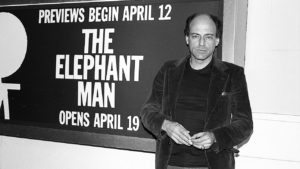In my “Sightings” column for the online edition of today’s Wall Street Journal I consider the phenomenon of the one-hit wonder. Here’s an excerpt.
* * *
Bernard Pomerance died the other day. Unless you’re a theater buff, it isn’t likely that you know his name, but you almost certainly know the name of a play that he wrote. “The Elephant Man,” based on the story of a congenitally deformed Victorian, was first performed to great acclaim in London in 1977, then opened on Broadway two years later, winning three Tony awards and running for 916 performances. It is, however, the only thing Mr. Pomerance ever wrote that met with success, commercial or otherwise….
 The annals of art are full of people like Mr. Pomerance. They’re known in the music business as “one-hit wonders,” artists who produce one hugely popular work of art, then fail to ring the gong of renown a second time….
The annals of art are full of people like Mr. Pomerance. They’re known in the music business as “one-hit wonders,” artists who produce one hugely popular work of art, then fail to ring the gong of renown a second time….
Why do imaginative writers go silent after hitting the bull’s-eye just once? In the case of the novelist, it’s important to keep in mind that the novel is an unusual art form, perhaps the only one fully accessible to the amateur. Any literate person can at least try to write a novel, a genre that is famous, even notorious, for its lack of structural rigor. All it takes is time, effort and a good story to tell. Therein lies the difference between narrative art and other forms of artistic endeavor: Storytelling is the simplest of art forms, one that everybody practices every day. We all have at least one tale to tell, that of our own lives, and if it’s sufficiently eventful, then it’ll be interesting to other people as well. Even a person who has led a dull life may have a rich, obsession-fraught inner life, one that is no less interesting. Moreover, it’s also possible to tell another person’s story, as historical novelists do, so long as that story has sufficiently powerful personal meaning to its teller.
Successful plays, by contrast, are almost never written by amateurs (“Wit” is the rare exception to the rule). They do, however, share with the novel the near-absolute imperative of plot, and most writers, be they amateurs or aspiring professionals, are typically at a loss after they’ve recounted the story, more or less disguised, of their own life and longings. Once they’ve told it, all they know how to do is tell it again, almost always with diminished effect….
* * *
Read the whole thing here.
David Bowie plays the title role in excerpts from the original Broadway production of The Elephant Man, directed by Jack Hofsiss:
